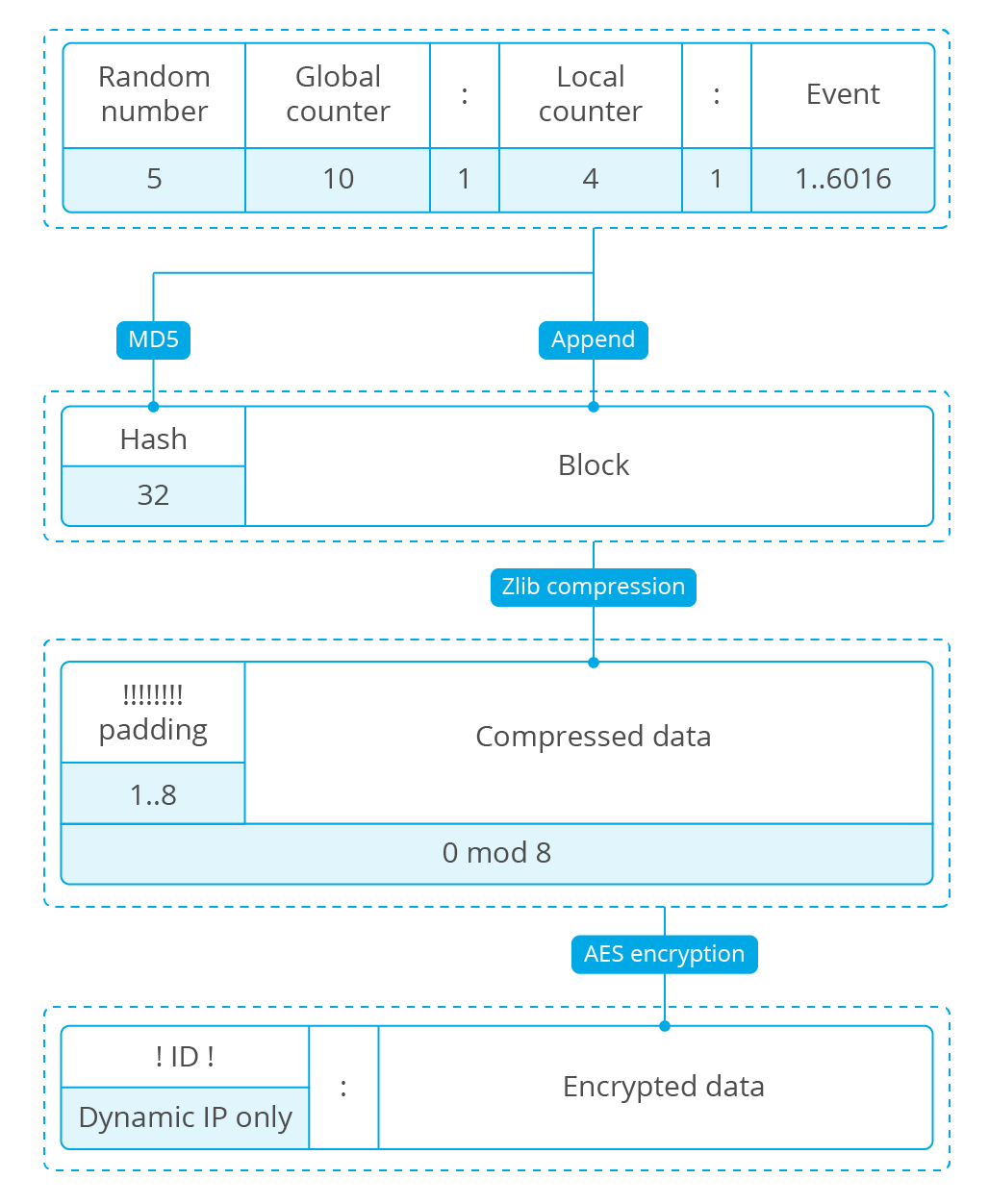Standard OSSEC message format
This page aims to describe the format of messages that OSSEC (and Wazuh) accepts and sends between its components:
- Input logs
Strings ingested by Logcollector from log files, Windows events, program outputs, etc.
- Standard OSSEC events
Data sent locally between OSSEC components, usually to Agent daemon (in agents) or Analysis daemon (in manager).
- Secure messages
Data delivered remotely between Agent daemon and Remote daemon.
Input logs
Input logs are messages ingested by Logcollector. They can be in Syslog format or any other custom format. In the former case the message header is parsed by the pre-decoder.
Syslog message
Nov 9 16:06:26 localhost salute: Hello world.
These logs go through a pre-decoding stage that tries to extract some data from the logs, in the case they are in Syslog format.
Date:
Nov 9 16:06:26Host name:
localhostProgram name:
saluteLog:
Hello world.
If the message is not in Syslog format, the log will be the full text.
The string in log is the input for decoders defined in XML format or plugin decoders.
Standard OSSEC event
OSSEC events are transmitted between software components of the same machine, using the local datagram socket at /var/ossec/queue/ossec/queue. For instance:
Log events from Logcollector to Agent daemon.
File integrity monitoring events from Syscheck to Agent daemon.
Policy monitoring events from Rootcheck to Agent daemon.
All of the previous events from Remote daemon to Analysis daemon.
The format of these events is:
<Queue>:<Location>:<Message>
- Queue
1-byte event type. It defines the decoding mode for Analysis daemon.
The most common queue types are:
- 1
Local file log, including Syslog messages, Windows event logs, outputs from commands, OpenSCAP results and custom logs.
- 2
Remote Syslog messages, received by the Syslog server at Remote daemon.
- 4
Secure messages. They are events from Remote daemon to Analysis daemon, that contain a standard OSSEC message plus the source agent ID.
- 8
Syscheck event. Analysis daemon parses it using the Syscheck decoder.
- 9
Rootcheck event. Analysis daemon parses it using the Rootcheck decoder.
- Location
Log source, typically the path to the file where the log was found.
- Message
Content of the log.
Example:
1:/var/log/syslog:Nov 9 16:06:26 localhost salute: Hello world.
Secure message format
Secure messages are those messages sent through a network between an agent (Agent daemon) and the manager (Analysis daemon). They are:
Encrypted.
Compressed.
Randomized.
Numerated.
Step by step procedure
Block
The block is the result of joining a header and the input event:
<Block> = <Random> <Global counter> ":" <Local counter> ":" <Event>
- Random
5-byte 0-padded random unsigned integer.
Size
5 digits
Padding
0-padded
- Global counter
Most significant part of the message counter.
Size
10 digits
Padding
0-padded
- Local counter
Least significant part of the message counter.
Size
4 digits
Padding
0-padded
- Event
Input message.
Hash
The hash is the 32-byte MD5 digest:
<Hash> = MD5(<Block>)
Compressed data
This object is the result of compressing the hash and the block (appended) through the DEFLATE algorithm, using zlib:
<CData> = Compress(<Hash> <Block>)
Padding
The compressed data is a byte array that must:
Have a size multiple of 8.
Start with one or more
!.
So the <Padding> object is a string of 1 to 8 ! symbols, so that the array resulting of appending both <Padding> and <CData> has a size multiple of 8.
<Padding> = 1..8 "!"
Length(<Padding> <CData>) = 0 (mod 8)
Encrypted data
The padded data is encrypted using Blowfish:
<Encrypted> = Blowfish(<Padding> <CData>)
The initialization vector and the encryption key are described in Encryption system.
Payload
The payload is the final message that will be sent to the peer (secure manager or agent). It starts with : and, if and only if the agent entry allows more than one host (address any or netmask different from 32), the agent ID between two ! symbols:
<Payload> =
":" <Encrypted>, if <Netmask> = 32
"!" <Agent ID> "!:" <Encrypted>, otherwise
Complete encryption formula
For agents with restricted address:
Blowfish encryption
":" Blowfish(<!-padding> Gzip(MD5(<Random> <Global> ":" <Local> ":" <Event>) <Random> <Global> ":" <Local> ":" <Event>))
AES encryption
"#AES:" Aes(<!-padding> Gzip(MD5(<Random> <Global> ":" <Local> ":" <Event>) <Random> <Global> ":" <Local> ":" <Event>))
For agents with unrestricted address (address any or netmask different from 32):
Blowfish encryption
"!" <ID> "!#AES:" Blowfish(<!-padding> Gzip(MD5(<Random> <Global> ":" <Local> ":" <Event>) <Random> <Global> ":" <Local> ":" <Event>))
AES encryption
"!" <ID> "!#AES:" Aes(<!-padding> Gzip(MD5(<Random> <Global> ":" <Local> ":" <Event>) <Random> <Global> ":" <Local> ":" <Event>))
This is the encryption flow chart:

Network protocol
The procedure to send a payload via network depends on the connection protocol:
- UDP protocol
The datagram is the payload itself:
Send(<Payload>)
- TCP protocol
Messages are not delimited by the network, so the payload size must be prepended to the payload:
Send(<Size> <Payload>)
The
Sizehas the following format:Size
4 bytes
Sign
Unsigned
Endianness
Little-endian
Encryption system
The encryption system uses a constant initialization vector and a key:
- Initialization vector
8-byte hexadecimal array for Blowfish method:
<IV> = FE DC BA 98 76 54 32 10
8-byte hexadecimal array for AES method:
<IV> = FE DC BA 09 87 65 43 21
- Encryption key
They key is built by appending and cutting hexadecimal strings depending on some agent attributes (see Client keys file):
<Key> = MD5(<Pass>) MD5(MD5(<Name>) MD5(<ID>))[0:15]
To clarify: the second MD5 hash is cut to its first 15 bytes (from 0 to 14th).
Example:
<ID> = 003 <Name> = myagent <Pass> = 2801fb64625a4ca5523395d8ab7370dbed275a227688542493c6577c3d9fdf2c MD5(<Pass>) = 7c07f68ea8494b2f8b9fea297119350d MD5(<Name>) = 370ca80d72402c8a4dbafa5b6888e2c5 MD5(<ID>) = e88a49bccde359f0cabb40db83ba6080 MD5(MD5(<Name>) MD5(<ID>))[0:15] = 78708afa69c1c76 <Key> = 7c07f68ea8494b2f8b9fea297119350d78708afa69c1c76